The Smart Chicago Collaborative has helped to run several civic hackathons including last year’s National Day of Civic Hacking events in Chicago. To help with this year’s National Day of Civic Hacking, we wanted to post how we organize and set up these events. We also wanted to go over tips and hazards to look out for when organizing these events.
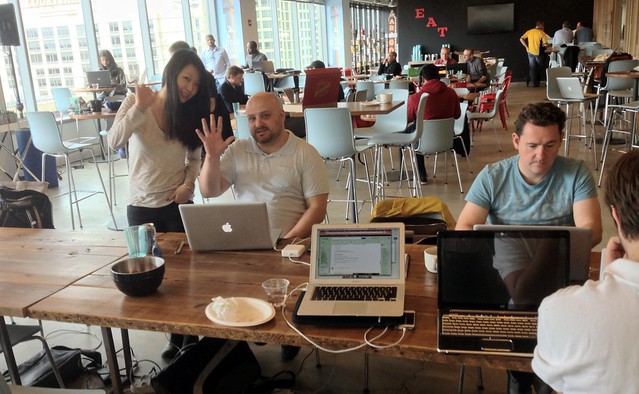
Safer Communities Hackathon at Google Chicago
First off, what is civic hacking?
Civic hacking is a term used to describe activities that lead to civic innovation and includes activities like building apps that help educate about or solve civic problems, working with open government data, and helping to teach digital skills.
Also, hackathons are good for some things and not for others…
There are some common critiques of hackathons that result from a misunderstanding on what civic hackathons are good for. We also want to differentiate between regular industry ‘hackathons’ which can double as marketing events and civic hackathons which have a much different purpose.
Hackathons are a tool for community organizing or organizing around a specific problem set.
Hackathons are not useful for:
- Building fully finished apps: The “Oh, let’s have a hackathon to build an app to solve all our problems!” type of hackathon generally flops because a weekend isn’t enough time to build a finished fully capable product.
- Getting people to use YOUR product: The “Oh, let’s have a hackathon and get people to use our platform to get more customers!” generally isn’t a good idea. Even with a prize for the best use of your tool, you aren’t really hosting a civic hackathon. You’re hosting a marketing event. Not that there’s anything wrong with that, but when you do this you are missing the point of hosting the civic hackathon in the first place. (Which should be spur civic innovation to solve social problems.)
- Building a very specific app that meets your very specific needs: The “We really want this, let’s order a bunch of pizza, hold a hackathon and have them do something!” is counter-productive. If you have a scope of work and know what you want, just hire somebody.
On the other hand, civic hackathons are useful if you want to:
- Organize people around specific problem set and brainstorming ideas: “We want to make our city sustainable. Let’s get the environmental affairs people together with the technologists ” type of hackathon. If you have a particular problem and a particular set of resources you can throw at it, a hackathon can help brainstorm ideas about how to address the problem. Keep in mind, this hackathon only works if you have subject matter experts *and* the technologists talking together.
- Organize to recruit people into the civic innovation community: The “there are not enough women/non-profits/journalists at our hack nights” type of hackathon. Hackathons can be great recruiting tools to get more people into your community. Granted, these types of hackathons are built for beginners and have more of a training element to them.
- Test out a new civic dataset or API: The “Ok, we finally got this dataset out.. now what can we do with it” type of hackathon. Fair warning: the data in it of itself won’t be enough. You’ll need to have subject matter experts on hand to help explain what the data is actually showing. For example, if you’ve released a new food inspection data set you should have somebody from the health department on hand to explain the details. (People are not good guessers). These types of events are good for seeing the types of projects that can be done with your new data set or API.
We want to start off planning for the hackathon by asking “what is it you want to accomplish?” That also leads us to a major point in having a successful hackathon.
Having a plan to carry on the work after the event.
While civic hackathons are a great organizing tool, they don’t always result in fully finished and tested civic apps. For that, other efforts need to be made to carry the work forward.
When thinking about your event, you should keep in mind having a plan for carrying the work forward. Does this mean starting your own weekly hack night? (So you can continue to work on apps started at the event a little bit at a time.) Does this mean finding grant funding to support the development of larger apps? (Using the hackathon to show the potential of these apps.) Don’t discount the power of small wins – particularly when your local civic innovation community is just starting out.
Hackathons can be a great spark to larger efforts. With that pre-text in mind, here’s the Smart Chicago approach to hackathons.
First, start with a problem:
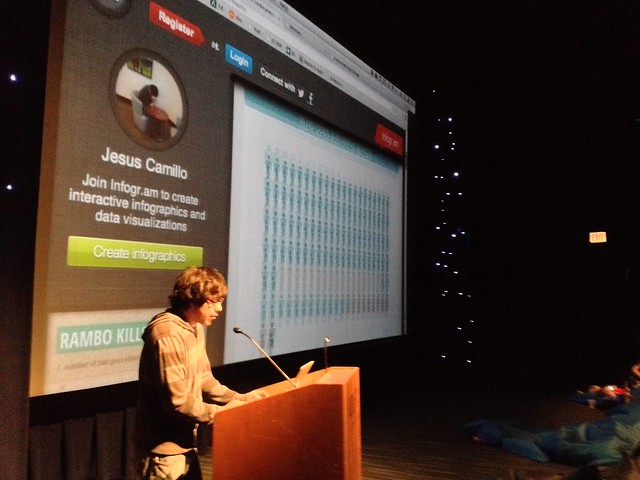
High school students presenting their app at the Hack for Youth event at the Adler Planetarium
Civic hackathons work best when focused on a specific problem set. The best way to highlight these problems is to bring in a subject matter expert who deals with the problem on an everyday basis. What to do a hackathon about crime? Better call the police department. Want to do something around housing? Recruit somebody from the local housing authority or somebody who runs a shelter. When trying to think about the needs and challenge of the front line, there’s no substitute for somebody who actually works in the front line to speak at your event.
You also shouldn’t wait until the day of the event to provide your participants with resources. By providing a resource list ahead of time (like this one we put together for the Chicago Police Department Safer Communities Hackathon) it helps get participants better prepare for the event. Hackathons may have challenge components, but that doesn’t mean everyone absolutely has to start from scratch.
Getting an agenda together
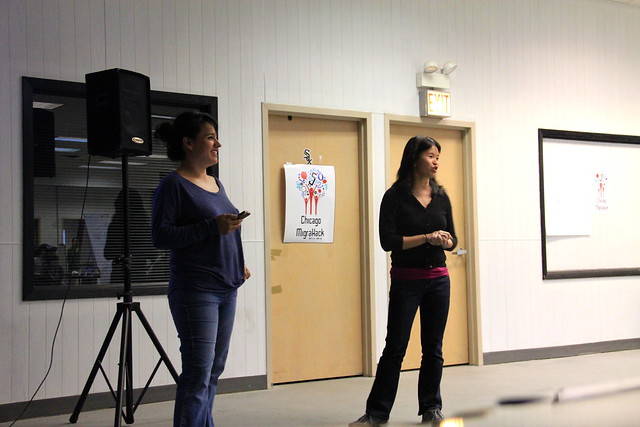
Claudia Nunuez and Phong Ly at the Chicago Migrahack
Your agenda will vary depending on the goal of your hackathon and it’s something that you should determine early on in your planning. There’s a temptation to have hackathons become two day sprints with participants getting little to no sleep. However, if the goal of the hackathon is to develop prototypes versus fully working apps – you may not need really need to make a coffee run at 2 in the morning.
The formats for our event tend to follow this general flow depending on what we’re trying to accomplish:
- 7:00am Event organizers arrive to help set up.
- 7:30am Food/Coffee/Water arrives
- 8:00am Breakfast
- 8:30am Welcome (“Hi, welcome! Here’s the wifi password, the bathrooms are over there.”)
- 8:45am Education (“Here’s what we’ve done so far, here are some resources”)
- 9:00am Problem Set (“Here’s the problem I’m facing in the day-to-day”)
- 10:00am Q & A (“Would this be helpful?” “How does this activity work?”)
- 10:15am Break out to form teams and hack!
- 12:00pm Lunch served
- 4:00pm Hacking ends, judging begins (if applicable)
- 4:30pm Project winners announced (If applicable)
Variations on this include having the talking portion of the event happen on a Friday night. (This is particularly helpful if you’re trying to have working prototypes by the end of the event.) This allows for a full day (or full two days) of hack time.
If we’re doing more of an unconference event, the format will go something like this:
- 7:00am Event organizers arrive to help set up.
- 7:30am Food/Coffee/Water arrives
- 8:00am Breakfast
- 8:30am Welcome (“Hi, welcome! Here’s the wifi password, the bathrooms are over there.”)
- 8:45am unConference 101 (“Here’s how unconferences work”)
- 9:00am Icebreaker (“Everyone is going to form a line based on a statement. If you agree head to the right, disagree head to the left. OK, the weather is too cold!”)
- 9:30am Throw session ideas on the board, vote, assign rooms
- 10:00am First Session
- 11:00am Second Session
- 12:00pm Lunch served (Throw out and vote on afternoon sessions)
- 1:00pm Third Session
- 2:00pm Forth Session
- 3:00pm Group Returns & Report backs (Here’s what we talked about)
These are just general examples and in the course of running the event you may find yourself running a bit behind. We always assume that things are going to run over by about 15 mins and just prepare accordingly. (We sometimes use the lunch hour to make up for time.)
Next, make sure you recruit a diverse set of participants
Once you have an agenda, it’s time to Recruit! Recruit! Recruit! People can get pretty busy and people can get even busier during the summer. In order to get people to your event you’ll need to start early. You can use your local organization’s email lists, social media accounts, contacts with local universities, companies, and news media to help spread the word.
The other things you’ll want to make sure of is that you recruit a diverse pool of participants. Reaching out to groups like the Chicago Women in Developers can be super-useful in doing this. Additionally, you’ll also want to make sure you have a diverse skill set at your event.
The best teams at hackathons are comprised of a mix of skillsets including developers, user interface designers, data scientists, and subject matter experts.
There are a few strategies you can use to try to get a diverse group of people to your event including reaching out to Meetup groups (like the Northern Illinois PHP group or the Chicago Interactive Design & Development Group), contacting web development schools like DevBootcamp, and talking to local universities.
There’s a few ways that you can do registration for the event. For our groups, we like to use Meetup since it allows us to host discussions on the event page. It also help to carry the movement on afterwards since you’ll have people joining your meetup group when they register for the event.
Venue and Logistics
Venues can make or break an event. A good venue will help you to ensure that the event runs smoothly, while a bad one will cause you to bounce around like a pinball trying to fix last minute everythings.
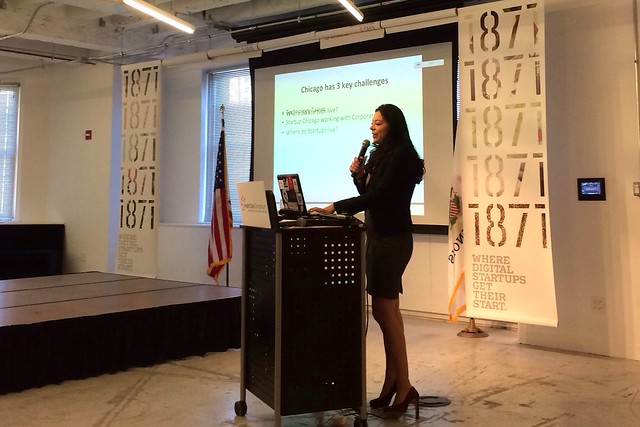
1871’s events manager Kristi Dula speaks at the Illinois Public Health Datapalooza
Co-working spaces like Chicago’s 1871 tend to make great venues. They’re designed to handle a large group of people all getting on the internet at the same time. They’re large enough so that people can break out into smaller groups and still be able to hear other. Many co-working spaces already come with their own audio-visual equipment. And, most importantly, co-working spaces often have staff on hand to help out.
For unconferences, large offices or colleges are also good options since you’ll need a lot of rooms to be able to run breakouts in.
When we look for venues to run our events here’s a list of things we look for:
- A location easy to get to, ideally near mass transit.
- A wifi network that can handle a hundred people at once. (Not always easy)
- The venue has either a lot of places to plug in or the ability to place more power strips out.
- A venue that has projectors and screens.
- A staff member that can be there during the event.
A venue can’t provide anything. Most of the time, this just means food. However, this can include other random items such as:
- Dongles (Because nobody has a laptop that will connect to your projector. You need one that links to VGA, Mac to HDMI, Mac to VGA, and so forth and so on.)
- Name Badges
- Snacks, Water, and Pop (remember to bring the healthy stuff)
- Power strips
- Post-it notes
- White Boards / Paper Easels
- Microphones / PA system
- Projector, Screen
- USB Drives
- Swag (laptop stickers, t-shirts)
- Directional signage (Where’s the bathroom?)
Venues can also be one of the bigger expenses, which brings us to our next topic.
Sponsorship

Karl Fogel and Derek Eder bring deep dish pizza to an OpenGov Hack Night
There are a number of costs that are associated with running a hackathon including:
- Food (We like deep dish)
- Supplies (Pens, markers, paper boards, power strips)
- Venue
- Your time (Even if you volunteer, you’re still donating your time)
A variety of sponsors can help defray the cost of running your event. If you’re a Code for America Brigade, you’re already getting some support. Chicago’s OpenGov Hack Night actually has a rotating list of sponsors including Smart Chicago, Thoughtworks, Code for America, and DataMade. You can also get in-kind donations such as the use of the venue, food, and use of software platforms and hosted space. (Smart Chicago Collaborative is part of the Chicago Community Trust and is funded in large part by the John D. and Catherine S. MacArthur Foundation. We *highly* recommend reaching out to your community foundation.)
Punch List
If you prepared everything right, then the actual day of the event can be easier then doing the prep work for it. Here’s our punch list of things to do before, during and after the event.
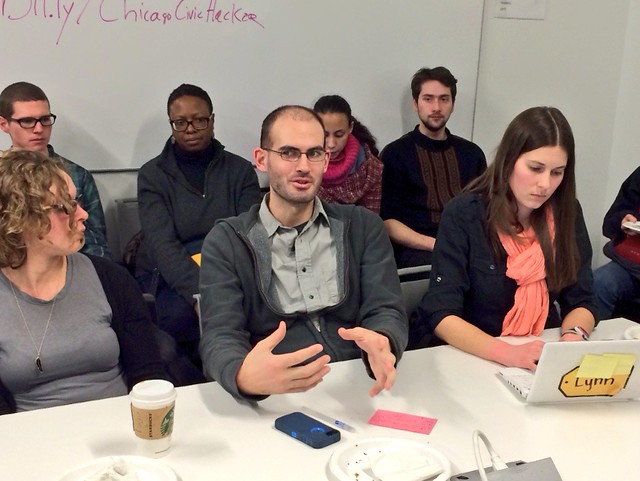
Steve Vance talking about the Divvy Bike App Challenge
Before:
- Venue walkthrough (everything look ready to go?)
- Reminders to attendees?
- Security has list of names?
- Food ordered?
- Social Media Set-Up
- Speakers slides? (Do you know how to pronounce their names?)
- If you’re speaking, did you rehearse?
- If you wanted press, did you talk to press?
- Did you do a final check-in with the other organizers?
- Sleep. (Seriously, go to bed.)
Day of:
- Signs out?
- A/V Up?
- Name tags set out?
- Chairs/Tables how you want them?
- Breakfast set up?
- People know where to go?
- Are you taking pictures?
After:
- Thank you notes
- Blog post about the event
- Follow-up to ensure work continues
Hackathons, particularly large ones, can take a lot of work. However, when done right they can be huge spark that kicks off civic innovation efforts in your city.
For more resources on hackathons, check out these sites:
- Outgoing Philadelphia Chief Data Officer Mark Headd’s personal blog
- Code for America Brigade 101: How to Run a Hack Night
- How to prepare to attend an unconference

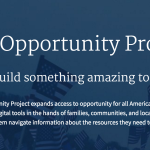


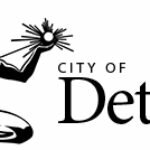


Really appreciate learning the nuts and bolts of these kinds of efforts! thanks!
This is a good resource. Thanks for putting it together.
And thanks for mentioning NI PHP!